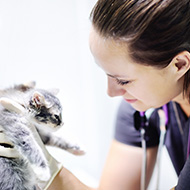'Protect the VN Title' survey launches

"The aim of the survey is to really dig deep and find out what this means to veterinary nurses, the wider profession and the public" - Alex Taylor, BVNA president.
The British Veterinary Nursing Association (BVNA) has released further details about its 'Protecting the VN Title' petition, which launches today (26 September).
Data garnered through the petition will be used to provide BVNA with an insight into how professionals feel about the issue and how it may or may not affect them and their patients. The association has also released a public survey, which veterinary practices are encouraged to share with their clients.
Alex Taylor, BVNA president, said: “Statutory protection of the title ‘veterinary nurse’ is long overdue. The aim of the BVNA survey is to really dig deep and find out what this means to veterinary nurses, the wider profession and the public.
“Although change can take time, it is happening, but we need to produce evidence that will further support this change – filling in this survey will do just that. Whilst safeguarding animal and public health are good enough reasons alone, for many veterinary nurses protecting the title has special meaning because it helps us feel more valued as professionals, which is vital if we want a sustainable workforce”.
The veterinary nurse title (VN) is not yet legally protected, meaning anybody can use the term, regardless of education or experience.
Statutory protection of the title has already been recommended to the government (DEFRA) by the RCVS Council following the work of its Legislation Working Party (LWP). It forms part of proposals for wider legislative change to the 1966 Veterinary Surgeons Act.
BVNA and the BVA have written to DEFRA to express their support for the recommendations made by the RCVS Council. Representatives from both organisations will also host a panel discussion at the upcoming BVNA Congress so delegates can ask questions about the campaign and gain insight into the legislative change process.
The profession has long called for the term "veterinary nurse" to be protected. In 2015, an RCVS-led petition to see if it could be considered for a debate in parliament collected some 36,000 signatures. However, this was not enough for a government petition at that time.
More recently, BVNA has collaborated with other professional associations who have achieved statutory title protection, such as the British Association of Dental Nurses (BADN), to inform their approach to lobbying at this time.
The survey aims to learn how veterinary professionals feel about the VN title's lack of protection and how this affects them personally, their patients, and pet owners. Additionally, it will provide more information on how the general public perceives the role of the veterinary nurse and how they feel about the potential use of unqualified staff.
The surveys for professionals and the public will remain open until Wednesday, 30 November. Following this, BVNA will publish and produce a report that will also be presented to DEFRA to support the proposal.
Click here for the survey for veterinary professionals and here for the public survey.



 The RCVS has announced a new version of its 1CPD mobile app, with enhanced features for veterinary surgeons and veterinary nurses to record their continuing professional development.
The RCVS has announced a new version of its 1CPD mobile app, with enhanced features for veterinary surgeons and veterinary nurses to record their continuing professional development.